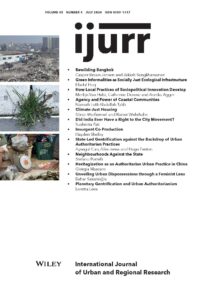This article examines the role of insurgency in scaling up the co-production of housing. Co-production has gained in popularity in the past 15 years as both a set of practices and an intellectual framing for analyzing urbanization in the global South. Discussions of co-production have largely emphasized the cooperative nature of the approach, asserting that a mostly non-confrontational politics has proven effective at reshaping urban governance in ways that better meet the needs of the urban poor. However, recent analyses have identified conflict versus confrontation as a key tension in co-production, especially as co-productive programs seek to go to scale. I contribute to these discussions by analyzing a well-known case of large-scale co-production, Thailand’s Baan Mankong program, to understand the roles of insurgent versus cooperative community networks in the program’s trajectory. I conclude that a more insurgent network opens up new land, resources and avenues for political participation. A more cooperative network then renders many of these interventions broadly politically acceptable to those in power. The two networks thus exist in a dialectic that has enabled the program’s scaling up. I argue that research into co-production should pay more attention to the importance of confrontational tactics by community networks.
Details
Written by:
Hayden Shelby
Digital Object Identifier (DOI)
https://doi.org/10.1111/1468-2427.13251
About DOI

